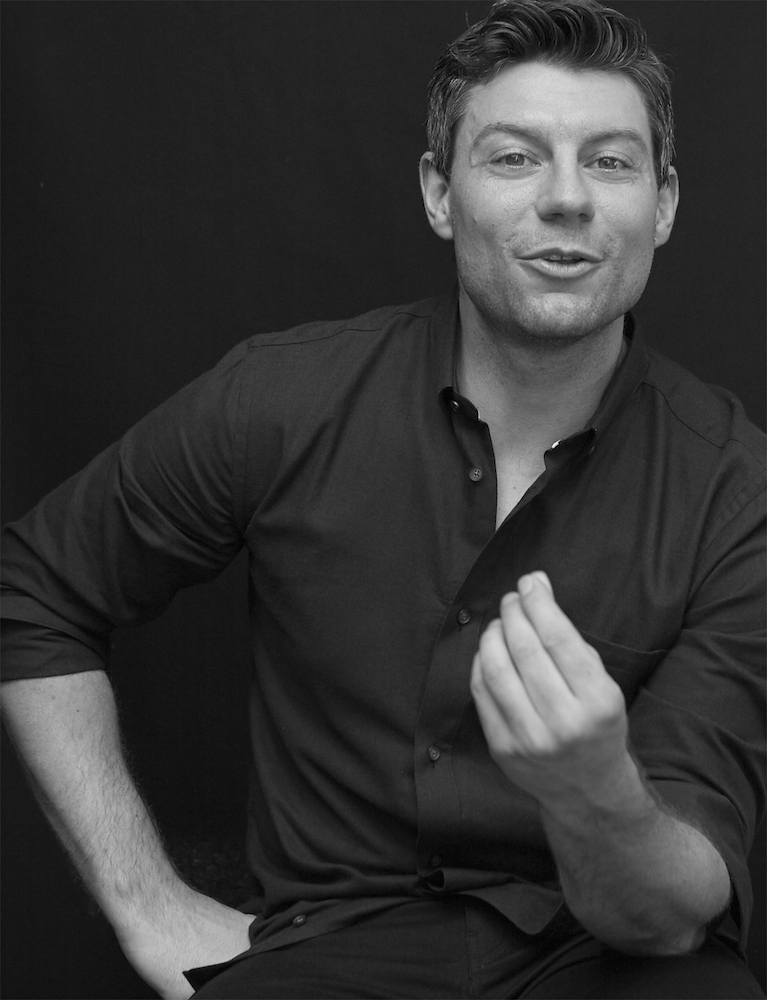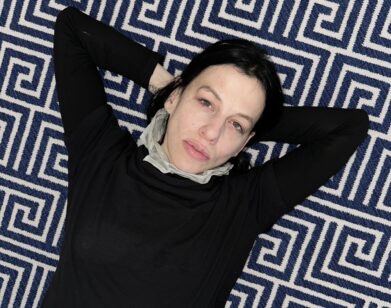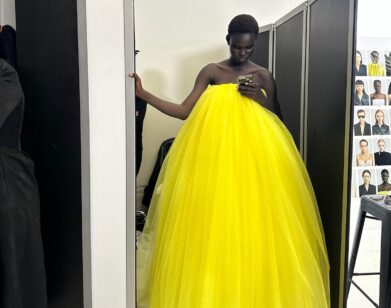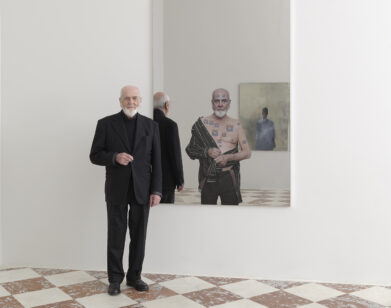Patrick Fugit
PATRICK FUGIT IN NEW YORK, JUNE 2016. PHOTOS: DENIS VLASOV. STYLING: CLAUDIA CIFU. GROOMING: LAURA DE LEON/JOE MANAGEMENT FOR CHANEL.
When we first meet Kyle Barnes, the protagonist of Cinemax’s new horror drama Outcast, he is in an unsustainable state of denial. Played by Patrick Fugit, Kyle has moved back into his dilapidated, small-town childhood home. Clearly some horrible thing has happened in his past: there are whispers about an abusive mother, an estranged wife (Kate Lyn Sheil) and daughter. When his stepsister (Wrenn Schmidt) coerces him out of the house, some locals unsubtly avoid him, while others offer their condolences. They tell him of Joshua (Gabriel Bateman), a young boy who has “fallen prey to dark forces…like what happened to your mother all over again.” Kyle’s stepsister insists his mother was ill—a sentiment Kyle unconvincingly echoes to the town preacher Reverend Andersen (Philip Glenister). “My mother was sick. I don’t know much else about it,” he says. “I was just a kid.”
But Kyle’s mother wasn’t sick, she was possessed by an evil force—possibly just evil itself—and Kyle was the one who exorcised her. With more and more people falling under evil’s spell, he can no longer ignore his powers.
Adapted by Robert Kirkman, creator of The Walking Dead, from his own comic book series of the same name, Outcast follows Kyle as he searches for answers with Reverend Anderson at his side. “When I initially got the material, I wasn’t really interested in possession,” explains Fugit while in New York. “But what Robert’s doing with it—the way that he’s telling the stories and the context and the rules that apply within the world—is unique, at least to me as an audience member.”
At 33, Fugit has already had a long career in film and television. He famously made his silver screen debut as Cameron Crowe’s teenage alter ego William Miller in 2000’s Almost Famous. From there, the Utah native has avoided the pitfalls of early stardom with roles in independent films like White Oleander, Saved, and Wristcutters: A Love Story. Two years ago, Fugit appeared in David Fincher’s adaptation of Gone Girl. While he’s had guest roles on television shows before, he’s never been a series regular. More than just playing the protagonist, in Outcast, he carries the show.
EMMA BROWN: Do you remember your first photo shoot for a magazine?
PATRICK FUGIT: Yes—it was terrible. It was the cover of Time Out New York. I was 17. I was some redneck, skater kid from Utah with long hair and they put me in fucking snakeskin pants and only a very sheer overshirt and they had three models hanging on me. They were beautiful women and I was some kid from Utah; it was the most awkward thing. And they kept telling me, “It’s going to look great! It’s going to look great!” [laughs] They had this wind blowing on me. I don’t what the fuck they were thinking. I don’t know what the fuck I was thinking. A couple of my friends were here in New York while the magazine was out, and they still have the goddamn cover in their collections. They’ll pull it out every now and then or send me a photo of it.
BROWN: How did you first hear about Outcast?
FUGIT: Laray Mayfield, who is a casting director in Los Angeles—she does a bunch of David Fincher’s movies—is very supportive of me and she sent me the project. I know when she’s attached to something it’s cool, so right away I was paying attention. Robert Kirkman’s name was on it and I was aware of The Walking Dead. I’m not an intense or devoted fan, but I really like Norman Reedus, so I was a bit excited. Then it was about possession, so I was a little hesitant, because I’m not particularly interested in that genre. But the scenes that I read, they were not about possession; they were about Kyle recounting a dark history to Reverend Anderson and a flashback where Kyle and his wife are deciding whether or not to have a child. It was very bright, the flashback, and loving, and still had this tone of darkness to it. They were both very character-driven scenes that had nice layers of storytelling to them. It was pretty traditional from there. I went in and auditioned, came back a few times, and then I got the part.
BROWN: How did you meet Loray?
FUGIT: Loray brought me in for a couple of things over the course of my career, but recently she brought me in for Gone Girl and I got that part. We’re batting a pretty good average, Loray and myself.
BROWN: When you first signed on, how much did the showrunners tell you about Kyle? How far into his arc did they go?
FUGIT: We talked a lot about why Kyle makes the decisions that he makes for the first couple of episodes and that maintains through the rest of the series so far. He very much wants to be part of his family again. He craves the light in the family life, the love that he gets and is able to give in that context, and so that’s a huge motivator for him.
BROWN: Had you done many projects with CGI and acting opposite things that aren’t there before Outcast?
FUGIT: I’d done a film called Cirque du Freak: The Vampire’s Assistant where I played a snake-boy, and I had five-hour special effects makeup everyday. We did some CGI—there was a little goblin character running around that wasn’t there on set—so I’d had some experience with it, but most of it is happening on Outcast.
BROWN: In the first episode, you have a physical fight with Joshua, the little boy, and you’re punching him. How did that work?
FUGIT: I just punched Gabriel [Bateman]. He’s a really tough kid. He had a stunt double—a bad-ass stunt woman who’s also very small—and I had a stunt guy, so they took all the hard knocks for us, but Gabriel and I still got in there and did a lot of stuff ourselves. [You’re] as careful as can be, unless you’re Gabriel, then you just bite and pull the hair of the other actor and punch them for real, which is cool. It’s committing. I accidentally hit him in the arm once, and that wasn’t great. [laughs] But it was controlled chaos.
BROWN: I know your mother has a ballet school. Is your dad creative too?
FUGIT: Dad is resourceful. Dad is creative, but I would say his creativity comes in teaching or mentoring and problem solving. He’s great with engines and motorcycles and stuff like that. He’s an expert motorcycle rider. He used to race motorcycles. The most inspiration I’ve seen my father have in the world is when I’m watching him ride a motorcycle. When he’s doing that he’s very graceful and very creative in the way that he rides. Other than that, he’s an electrician and a carpenter and all sorts of different things.
BROWN: Are you one of those people who wanted to be an actor when you were five years old? Did you ever want to be a fireman?
FUGIT: Well, Dad was a motorcycle racer, so that was first.
BROWN: I’m sure your mother was thrilled.
FUGIT: Even Dad told me, “Listen, you can’t be a motorcycle racer. You’ll break all of your bones and it’s stupid and you can’t do it.” But very early on, I got into the idea of performing and acting and I loved it. From almost as early as I can remember, I wanted to be an actor.
BROWN: Are you the eldest? Did you practice your acting skills on your younger siblings by making them believe things that weren’t true?
FUGIT: Yes, but we would also make action movies with our huge VHS camera. My poor brother, he was much smaller than I was and we would make these action sequences—this is so terrible—where I would take him and throw him over the couch or throw him into the wall or I’d grab him and knee him in the stomach and he’d go tumbling through the hallway or something like that. I’ve seen these home videos recently, and I was way too rough with him. He’s bigger than me now and much better looking, so he’s getting back at me for all of that.
BROWN: Was he happy to be thrown around because it meant he got to hang out with his cool older brother?
FUGIT: I think that was part of it. Every now and then he’d be like, “Ow, you’re hurting me.” And I’d be like, “Shut up!” I would go overboard and he would cry and then Mom would come down and that would be the end of the filming for that day. [laughs]
BROWN: When did you leave Utah?
FUGIT: I waited as long as I could, until 2009 or 10. I lived in Utah for almost 10 years after I started my career. I would go back and forth to L.A. or I would come here for different things. I love Utah, so I hung onto it for as long as I could. Then I had to be realistic: “Okay, if I’m going to be an actor and have any kind of career, I’ve got to be on either coast.” L.A. it was. My family is all in Salt Lake City still.
BROWN: Have people been approaching you about Outcast?
FUGIT: So far, only at conventions. When we go to the Comic-Cons, they’re pretty exited about Outcast. Most of the time out on the street I’ll get Almost Famous or I’ll get the people who are like, “Do I know you from…high school? How do I know you?” Or some people will come up and reference a more obscure indie film that I’ve done, and those are the ones that I like. There was a movie I did called Wristcutters: A Love Story, and I really liked it. I liked being a part of it and I liked the finished product, so when people come up and reference that one I always know that they’re the right kind of weird.
BROWN: Did you take some time off from acting when you were in your late teens?
FUGIT: I don’t know that it was totally by choice. There were definitely opportunities for me to work when I was 17, 18, but a lot of it was very similar to Almost Famous. I think for probably a year and a half, we were picking and choosing to see what came along. Then a Swedish director named Jonas Akerlund came through and he had this movie called Spun about meth addicts, which was really cool. I was into playing that part; it was a huge tonal shift from the character that I had done prior. There was that, and then a movie called White Oleander, which I shot at the same time. They were different characters and they were cool projects, and now and then there’d be a gap in between.
BROWN: Did you watch a lot of movies growing up?
FUGIT: Yeah. I loved watching movies. I loved Monty Python; I loved The Simpsons. Things like that really helped define my taste in humor. But then there’s things like Indiana Jones, ’80s and ’90s Steven Spielberg-era, along with the Ron Howard movies that came out then. Then I really got into stranger, more unique stories like What’s Eating Gilbert Grape, Rushmore, 400 Blows. As I started working, I really started appreciating the art form of filmmaking a lot more.
BROWN: Is there a role you’ve always wanted to play or a muscle you’ve always wanted to flex but don’t feel like you’ve had the opportunity to yet? Do you think about it that way?
FUGIT: Yeah, sometimes. I’ve made choices so far that I felt were based on having variety and being different. Certainly I’ve played characters that are similar tonally. I think I have a certain natural tone that certain kinds of films end up casting me for. That can’t be helped. There are parts that I play that are similar, but I always try to be a bit different and make some strange or unique choices. I feel very good about a lot of the different characters I’ve been able to play.
BROWN: Which character was closest to you personally?
FUGIT: I think probably Almost Famous. I was pretty early on in my developmental timeline in terms of my skill set in acting and also my own personal life. I was going through puberty and coming of age, so my real-life experience paralleled quite a bit the experience of the character in that film. I think I wouldn’t have been cast in that film had I been more aware of how similar the character and I were.
BROWN: Can you watch that film now?
FUGIT: Absolutely—I love watching that film. There’s so much of that film that I did on purpose because we’d prepared it, but there’s also so much of that film that’s just naturally coming out of me as a 16-year-old in that time and in those circumstances. It’s very interesting to watch what I was focused on technically as an actor, but it’s also interesting to see what just happened because of who I was and where I was at the time. It’s also, I think, a really great film. It’s bizarre that I was a part of it now. When we were filming, it was at the end of the golden age of 35 mm film, and some of my favorite film images come from the late ’90s. It was before film looked too perfect, but it looked better than it had so far. It was this waning light in the era of widescreen or 35 mm film, which I didn’t know at the time was really exciting. I was only able to appreciate that six, seven years down the line, once we started jumping over to RED cameras and things like that. It’s an awesome thing to watch because it’s so much a part of its time, but it also holds up so well because of how personal it was for Cameron Crowe and how it came off.
OUTCAST AIRS FRIDAYS ON CINEMAX.







